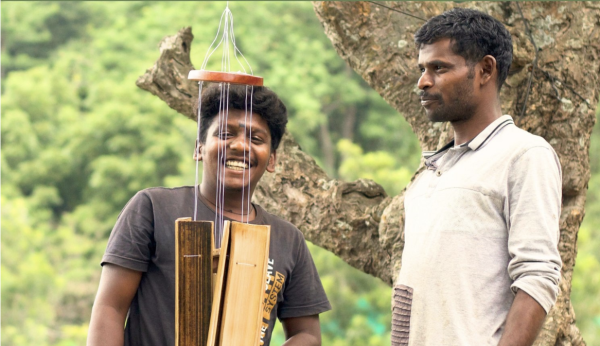MRC Speaker Series Features “dapperQ” Founder
Anita Dolce Vita, who has produced some of the largest queer fashion shows in the United States and is the owner and Editor-in-Chief of leading online queer style magazine dapperQ, came to Oberlin to give a talk on queer style as visual activism Saturday afternoon. Dolce Vita has produced shows at the Brooklyn Museum, the Institute of Contemporary Art/Boston, and SxSW, and her work has been featured by The New York Times, HBO, OUT Magazine, and many other prominent outlets. Her talk was organized as part of the Multicultural Resource Center’s My Name Is My Own speaker series, which centers the experiences of queer and trans people of color.
dapperQ, which Dolce Vita describes as “one of the world’s most widely read queer style digital magazines,” is well-known among the queer community and boasts over 45,000 social media followers. College senior Monique Newton, who attended the talk, said she appreciated having a speaker involved in a project of this magnitude present her work on campus.
“I follow dapperQ on Instagram,” Newton said. “They’re really big, especially in the POC queer community, so I definitely knew who they were. And as soon as I saw who was coming, I was really, really excited. It was great hearing her talk about the intention behind each and every thing that dapperQ does, in terms of each and every fashion show and every model. … It was just really nice hearing someone who’s in charge of this cool organization and in this position of power talking about how it was really important that she included femme queers into the discussion, and disabled people into the discussion, and just being really intentional about who they were including in the whole organization.”
For MRC Student Life Program Coordinator Khalid Taylor, OC ’17, bringing speakers like Dolce Vita to campus is particularly important because they can be role models for students whose identities are often marginalized.
“Part of the reason of bringing queer and trans people of color [to campus] is often that their voices are not centered or appreciated, and the intersection of their identity is not often given space to exist in many different areas,” Taylor said. “Anita Dolce Vita, for example, … [is] really trying to understand the dynamics of what it means to break the standards of heteronormative concepts of what it means to present or perform a certain type of way. I think she is an amazing role model and an amazing powerhouse, because she’s … a nurse by day and an amazing founder of an incredible fashion-based organization that centers marginalized voices by night.”
In her talk, Dolce Vita spoke about the many nuances and layers of queer style and the way that they interact with people’s own lives and with the mainstream fashion industry, and how a multiplicity of queer identities and experiences can and should be uplifted through fashion.
“The LGBTQ community is at the forefront of revolutionizing the way in which we look at garments in relation to our gender performance and expression,” Dolce Vita wrote in an email to the Review. “Our self-expression through fashion exemplifies the basic principle that style is a personal, curated, artistic reflection of who we are on the inside, and by fearlessly breaking norms, we have created a social movement that enables every member of our society to benefit from less restrictive, less oppressive ways of expressing ourselves. Given the mainstream fashion industry’s current hyper-focus on ‘gender neutral’ style as a ‘trend,’ I was most excited to discuss how queer style is part of our daily lived experiences, not just a trend, as well as explore how other queer expressions, such as femme style, are radical and deserve visibility.”
For Newton, this idea of fashion as more than just clothes or trends was especially resonant.
“I really liked the points she made about how what you wear is so important to how you feel,” Newton said. “Oberlin is very diverse in terms of fashion and style and what people wear, and so I hope that people took away [the idea of] seeing fashion in a more critical lens.”
Dolce Vita examined queer aesthetic from an activist point of view, exploring a long history of style as a mechanism for social change.
“Queer style has its own revolutionary roots, but is also part of a rich legacy of style as visual activism, including the symbolic political resistance of the flapper dress, Zoot suit, and hip hop style, to reference a few examples in popular Western culture,” Dolce Vita wrote in an email to the Review.
Dolce Vita’s talk mentioned the histories of queer fashion in communities of color, which are often erased when styles created by these communities are appropriated by the white queer community or by the mainstream fashion industry.
“Being from New York, I know about the ballroom scene — the queer, LGBTQ and Latino ballroom scene, about voguing and the history of that community, and how that has come up in a lot of current fashion trends and fashion trends since the ’80s, which is when the scene was at its highest,” Taylor said. “Much fashion and so many social trends were taken from the community without actual recognition and without actual praise, and without the consent of these communities, without empowering these communities financially or giving them the credit that they deserve. How are you going to take their fashion, how are you going to take their style, how are you going to take their way of existing, but then punish them and penalize them for existing in that way?”
Dolce Vita also mentioned scientific reasons why fashion has such an impact on people’s lives, which Taylor found to be a particularly impactful part of the talk.
“I loved how she brought up aspects of embodied cognition,” Taylor said. “The idea of what you wear or the value you assign to clothing really determines how you wear it, and also how you perform or how you present or how you enact your day.”
dapperQ is currently involved in a number of high-profile projects, such as organizing a show at New York Fashion Week and preparing to present “RompHims and Boyfriend Jeans: Ungendering Fashion” at SxSW this March.
Oberlin will also host a fashion show — Sankofa Remix’d: Reclaiming My Fly, in recognition of Black History Month — March 3.
“It’s going to be an amazing event, and will hopefully incorporate the lived experiences of many different folks, particularly Black folks,” Taylor said. “We’ll bring to light the identity, the culture, the lived experiences of Black communities in different forms.”
For Taylor, celebrations of queerness and queer fashion are particularly important in the face of often hostile reactions, especially toward more marginalized members of the queer community, who often dress in ways that subvert or challenge existing binary notions of fashion.
“I think queer and trans voices and queer style in particular, needs to be celebrated,” Taylor said. “Because there’s so much hate that goes to it, without the balance of celebration, without the balance of positivity, without the balance of it being seen as something that is worthy of the light and the praise and the glory, then there’s no balance.”







